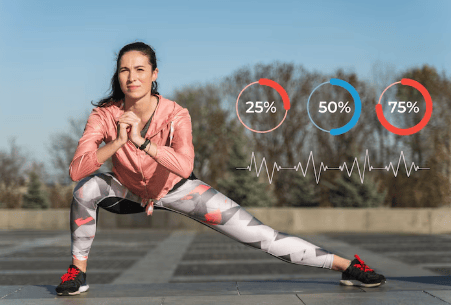Wellness isn’t just a buzzword anymore—it’s a lifestyle. And in 2025, it’s getting a major upgrade. The world of health is changing fast, and the top wellness trends 2025 are a reflection of how people are rethinking what it means to feel good—mentally, physically, and emotionally. From high-tech wearables that track your stress levels in real time to ancient healing practices making a powerful comeback, wellness has never been more dynamic.
What’s driving all of this? A shift in mindset. People are prioritizing preventative care, personalization, and emotional well-being like never before. These health and wellness trends aren’t just hype—they’re grounded in science and backed by experts who know what works.
This guide breaks down the biggest movements shaping how we live and care for ourselves. Whether you’re a biohacker, a yoga lover, or someone who just wants to feel better every day, these insights will help you stay ahead of the curve—and maybe even transform your daily routine.
Ready to find out what’s next in wellness? Let’s dive in.
Top Wellness Trends for 2025
As the wellness industry evolves, 2025 is shaping up to be the year of science-backed self-care, personalized tools, and a deeper understanding of the mind-body connection. From biohacking to nervous system regulation, the latest wellness trends in 2025 reflect a growing desire for longevity, emotional balance, and sustainable habits.
Here’s a breakdown of the key trends that are set to define the year:
A. Nervous System Regulation
The wellness world is shifting from high-intensity everything to calming the nervous system. In 2025, practices like vagus nerve stimulation, breathwork, and cold exposure therapy are going mainstream—not just for athletes, but for anyone seeking emotional balance.
These methods are backed by a surge of research into trauma recovery, anxiety, and stress resilience. Breath-based exercises, particularly slow diaphragmatic breathing, stimulate the vagus nerve and activate the parasympathetic (“rest and digest”) response. Likewise, cold plunges and contrast showers improve circulation and mood by triggering a hormetic stress response.
Expect to see more at-home vagus nerve devices, nervous system coaching, and guided somatic therapies designed to bring balance back to the body and brain.
B. Longevity & Cellular Health
Longevity isn’t just a Silicon Valley obsession anymore—it’s gone mainstream. In 2025, supplements like NMN (nicotinamide mononucleotide), NAD+ precursors, and fisetin are dominating wellness shelves, promising cellular repair, mitochondrial support, and age-related disease prevention.
What’s changing? The average consumer is becoming more interested in evidence-based biohacking, particularly when it involves extending “healthspan”—the number of years you stay healthy, not just alive. Influencers and health professionals are promoting lifestyle habits like intermittent fasting, strength training, and DNA testing as ways to optimize everything from metabolism to brain function.
This merging of science and self-care is reframing aging as something that can be influenced—if not entirely controlled—by daily behaviors.
C. Sleep Optimization 2.0

The sleep space is getting a serious tech upgrade. While wearables like Oura rings and Whoop bands have been popular for a few years, 2025 is introducing sleep optimization 2.0—with EEG headbands, circadian lighting systems, and AI-based sleep coaching apps entering the scene.
Better sleep isn’t just about more hours—it’s about sleep quality, timing, and environment. Tools like smart bulbs that shift from cool to warm tones throughout the day help sync circadian rhythms. Meanwhile, apps that track REM cycles and recovery scores are giving users a real-time picture of their neurological rest.
With sleep now widely linked to mental health, immunity, and metabolic function, people are investing in their rest like never before.
D. Gut-Brain Wellness
One of the most significant wellness trends for 2025 is the exploding interest in the gut-brain axis. As studies continue to reveal how gut bacteria affect mood, cognition, and inflammation, people are taking gut health seriously—especially in connection to anxiety, depression, and brain fog.
Popular tools include probiotics, psychobiotics (bacteria strains shown to influence mental health), and fermented foods like kefir, kimchi, and miso. Companies are now offering microbiome sequencing kits to personalize nutrition and supplement plans based on gut diversity.
This trend also intersects with the rise in anti-inflammatory diets, fiber-rich foods, and digestive enzyme blends aimed at improving both mental clarity and immune resilience.
E. Digital Boundaries & Dopamine Detox
In response to rising burnout and constant notifications, 2025 is seeing a wellness shift toward screen-time boundaries and “dopamine detoxing.” The idea? Reclaim your attention, reduce overstimulation, and reset your reward system.
People are turning to tech-free retreats, digital Sabbath weekends, and mindfulness apps that encourage offline reflection. This trend is especially popular among Gen Z and Millennials, who are looking for ways to stay mentally present in an attention-fragmented world.
Whether it’s deleting social apps for a week or choosing analog alternatives (journaling, yoga, walking), this movement is all about regaining control over our digital lives.
F. Adaptogens and Personalized Supplements
The buzz around adaptogens continues into 2025—with a growing emphasis on personalized supplement stacks. Herbs like ashwagandha, rhodiola, and reishi mushroom are showing up in everything from capsules to functional beverages, all aimed at helping the body manage stress more efficiently.
What’s new this year is the customization. Thanks to at-home blood testing, DNA panels, and hormone tracking kits, users can build supplement plans tailored to their physiology. Some wellness brands are even offering monthly stack deliveries based on lab results and wellness goals.
This blend of traditional plant medicine and modern diagnostics reflects a larger trend: personalized, data-driven wellness that meets people where they are.
G. Inclusive, Body-Neutral Wellness
Perhaps one of the most important shifts in 2025 is the growing embrace of body neutrality and inclusive wellness. More consumers are rejecting diet culture and instead prioritizing sustainable self-care, mental wellbeing, and movement that feels good—not punishing.
Brands are responding with adaptive fitness programs, accessible meditation tools, and campaigns that feature all body types, genders, and abilities. Mental health support is also expanding through low-cost virtual therapy and peer-based models, making care more available to underrepresented communities.
This evolution reflects a maturing of the wellness space—less focused on aesthetics, and more on how people feel, function, and connect.
Whether you’re looking to improve your energy, extend your lifespan, or simply feel more grounded in a digital world, the wellness trends of 2025 offer science-backed tools with real potential. Just remember—what works best is personal, and wellness is ultimately about building habits that support your unique body and lifestyle.
What’s Fading Out in 2025
Wellness isn’t just about what we’re adding—it’s also about what we’re leaving behind. In 2025, people are finally walking away from some of the most outdated wellness trends, and honestly, it’s about time.
First on the chopping block? Extreme cleanses and detox teas. These quick-fix “solutions” never delivered long-term results and often left people feeling worse. Today’s approach is rooted in nourishment, not punishment.
Also on its way out: the “no pain, no gain” fitness mentality. People are swapping punishing workouts for more mindful movement. Think mobility training, strength with intention, and workouts that support—not exhaust—the nervous system.
The days of one-size-fits-all supplement claims are fading too. Consumers are savvier now. They want evidence, personalization, and products that actually align with their biology, not just flashy labels.
And perhaps the most refreshing shift? A decline in hustle culture and toxic productivity. More people are recognizing that rest is productive. Mental clarity, emotional balance, and time off are becoming non-negotiables in a well-rounded life.
So, what’s out in 2025? Anything that pushes extremes, ignores individuality, or sacrifices well-being for aesthetics or output. Wellness is becoming smarter—and kinder.
Expert Opinions on 2025 Wellness Trends
With so many health fads flooding the market, it’s easy to wonder—what actually works? That’s why hearing from professionals is more important than ever. When it comes to expert-backed wellness trends, most doctors and licensed practitioners agree: the best trends are those rooted in science and sustainability.
Dr. Erin Walker, a functional medicine physician, says, “We’re finally seeing a shift toward nervous system regulation and gut-brain health—which I’ve been advocating for years. These are powerful, research-backed areas that can truly change lives.”
Registered dietitian Alicia Moore echoes that sentiment. “People are getting smarter about supplements. Instead of popping random pills, they’re testing their nutrient levels and choosing products that work with their genetics and lifestyle.”
But it’s not all green lights. Experts are also urging caution. Health coach David Lin, who works with high-performing professionals, warns, “There’s a fine line between self-care and obsession. Over-optimization can backfire, especially when people start chasing every new gadget or protocol without understanding their own needs.”
This skepticism is echoed by physicians who’ve seen the fallout of wellness misinformation. While many 2025 trends show promise, experts agree that no trend should replace personalized, evidence-based care.
In short, doctor opinions on wellness reinforce the value of critical thinking. Trends should support your health—not confuse or overwhelm you. Stick with what’s rooted in science, listen to your body, and avoid anything that sounds too good to be true.
FAQs: 2025 Wellness Trends, Explained
Which 2025 wellness trends are actually science-backed?
Trends like gut-brain wellness, sleep optimization, and nervous system regulation are supported by solid research. Clinical studies have shown links between gut microbiome health and mental well-being, while wearables and circadian syncing are proving effective for sleep quality. Longevity supplements like NMN and NAD+ are still being studied, but early findings are promising.
Is cold exposure really good for you?
Yes—when used responsibly. Cold plunges and cryotherapy have been shown to improve circulation, reduce inflammation, and support mood. However, benefits vary by individual, and cold exposure should be approached gradually and safely.
What’s the best supplement for longevity?
There’s no magic pill, but compounds like NMN, NAD+, and fisetin show potential. These work at the cellular level to support energy and healthy aging. Still, consult a healthcare provider before starting any new supplement—especially those linked to 2025 health trend facts.
What is nervous system healing and is it legit?
Absolutely. Nervous system regulation, often involving breathwork, vagus nerve stimulation, and trauma-informed practices, is gaining clinical traction. It’s not just about “relaxing”—it’s about helping your body process stress in healthier, more sustainable ways.
Conclusion: Wellness That Works for You
Wellness in 2025 isn’t about keeping up—it’s about tuning in. These trends aren’t rules you have to follow; they’re tools you can use to support your well-being in ways that feel right for you. The top wellness choices 2025 are diverse, flexible, and more mindful than ever.
The key? Don’t chase every trend. Instead, focus on choosing health trends that align with your lifestyle, your values, and what your body actually needs. From nervous system support to personalized supplements, what matters most is how these tools fit into your life—not someone else’s version of “healthy.”
This year is all about intentionality. Smarter choices. Gentler rhythms. And a wellness routine that supports—not overwhelms—you.
Because true wellness doesn’t follow a trend. It follows you.
